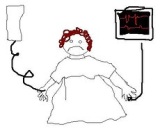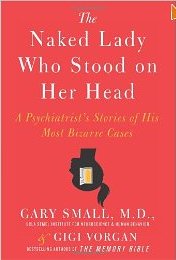March 4th, 2011 by Bryan Vartabedian, M.D. in Opinion, True Stories
No Comments »

This week a reporter cornered me on the issue of professional behavior in the social space. How is it defined? I didn’t have an answer. But it’s something that I think about.
Perhaps there isn’t much to think about. As a “representative” of my hospital and a physician to the children in my community, how I behave in public isn’t any different than a decade ago. Social media is just another public space. Sometimes it’s easy to forget that we’re in public. When I’m wrapped up in a Twitter thread it’s easy to forget that the world is watching. But the solution is simple: Always remember that the world is watching.
On Twitter I think and behave as I do in public: Very much myself but considerate of those around me. I always think about how I might be perceived.
Here’s a better question, online or off: What is professional behavior? I have a pediatrician friend who, along with the rest of his staff, wears polo shirts and khaki shorts in the summer. The kids love it. One of my buttoned-down colleagues suggested that this type of dress is “unprofessional.” Or take a handful of physicians and ask them to review a year of my blog posts and my Twitter feed. I can assure you that some will identify elements that they find “unprofessional.” I believe I keep things above board.
This is all so subjective.
The reporter was also interested in how I separate my professional and personal identities in the online space. I’m not sure the two can be properly divided. The line is increasingly smudged. I try to keep Facebook as something of a personal space. I think it was Charlene Li who suggested that she only “friends” people she knows well enough to have over for dinner. That’s evolving as my rule as well. But independent of how I define “well enough,” Facebook is still a public space. My comments and photos can be copied to just about anywhere.
Social media has not forced the need for new standards of physician conduct. We just need to be smarter than we were before. Everyone’s watching.
*This blog post was originally published at 33 Charts*
November 2nd, 2010 by admin in Health Policy, Humor, Opinion, True Stories
No Comments »
This is a guest post from Carolyn Thomas:
 An Open Letter To All Hospital Staff
An Open Letter To All Hospital Staff
Dear hospital employees,
After a particularly bizarre experience undergoing a treadmill stress echocardiogram at your hospital recently, I decided to do something that I have never done before: I called the manager of the cardiology department to complain about her staff. (Incidentally, a recent opinion survey of international tourists found that Canadians were #1 in only one category: “Least likely to complain when things go wrong” — so you can appreciate that lodging an official complaint is a fairly big deal here!)
In my best PR fashion, I told the manager how distressing the appointment had been because of the behaviour of the two cardiac technicians in the room. It’s not so much that they were openly rude, but it was their insufferable lack of people skills that had pushed me over the edge. No introductions, no eye contact, no consideration of how awkward this test can be, no explanation of the test procedures or even the flimsiest effort at polite conversation. To them, I was merely the 1:00 o’clock appointment, the obstacle between them and their next coffee break, just a piece of meat on a slab — but worse, an invisible piece of meat. Read more »
October 17th, 2010 by Dinah Miller, M.D. in Better Health Network, Book Reviews, Opinion, True Stories
No Comments »


 I just finished reading Dr. Gary Small’s book, The Naked Lady Who Stood On Her Head.
I just finished reading Dr. Gary Small’s book, The Naked Lady Who Stood On Her Head.
In the final chapter of the book, Dr. Small talks about his mentor, friend, and father figure who’s mentioned throughout the book. The mentor approaches him on the golf course, where they meet to talk, and says he needs psychotherapy and Small is the man to do it. The author is surprised, hesitant, and a bit uncomfortable with the demand (it comes as more than a request.) His wife likens it to the need for a plumber or a dentist, and Dr. Small takes on the task. The mentor calls all the shots: Where the meetings will be, what pastry they will eat, the form of his payment. The author initially misses the diagnosis and uses this as an example of how one can be blinded.
So is it okay for a friend to treat a friend? Read more »
*This blog post was originally published at Shrink Rap*















